True Crime: Streets of LA
Tom returns to the streets of LA... unconventionally.
With the next Grand Theft Auto title still a year away and the coast clear on the Getaway expansion pack front, there's a definite gap for a city-based action title this Christmas, and it's hardly surprising to see Activision and Luxoflux stepping up to try and fill the void - someone was bound to. But although comparisons with GTA III and its multi-million-selling sequel are inevitable, True Crime actually does a good job of setting out its own stall, with more of an emphasis on hand-to-hand combat, gun-slinging car chases, a Getaway-style narrative, and almost RPG-like progression as stereotypical LA cop Nick Kang steps off suspension and finds himself fighting to wrestle the City of Angels out of the hands of high-rolling crooks, accumulating new tools, tactics and grapple holds along the way.
True to life
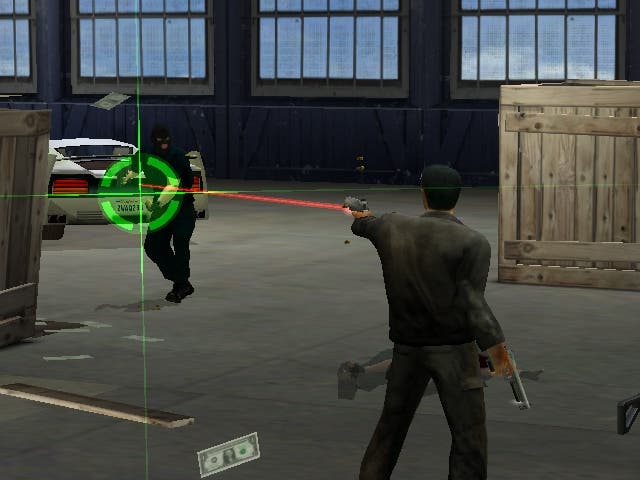
As Rockstar has something of a monopoly on cartoon-based ultraviolence, pretenders to the crown often focus on a grittily realistic alternative, and True Crime certainly makes its first big strides in this direction. As with Sony's The Getaway, developer Luxoflux has clearly been out and about with a camera and a portable Maya rig, documenting several hundred square miles of Los Angeles to great effect - and we pity the poor sods who had to wander around Downtown snapping pictures of the steel spiked railings and gangbangers lounging against assault rifles.
Having spent a little under a week there in my whole life, otherwise having to rely on Hollywood's autobiographical account of the stars, red lights and platter-spanning steaks, I'm not the best person to comment on the game's accuracy, but, as we found with The Getaway, locals are easily impressed - and will happily spend hours just tottering around their home town taking in their own sights and sounds, and even driving right up to their own doorstep to marvel at the detail. It's a unique experience for them, but thanks to low-resolution textures, some clipping issues, a rather horrible depth of field effect and a lack of screen-filling vistas, outsiders will probably think of True Crime's "Streets of LA" as just another city-based environment, and the game's precision may even work to its detriment.
Certainly, it's nice to have the option to literally drive between places, but the distances involved are huge, the lack of traffic is striking [especially when you consider what a car choked nightmare it is in real life - Ed], interaction along the way is forced, and progress through the city is all too easy. There were times in True Crime when, with the exception of race-against-the-clock type missions, our leisurely passage between objectives became a matter of finding a big, long, straight bit of road (of which there are many), pasting down the accelerator (X) and glancing over a few emails in the meantime. With no load screens as you make your way around town (although you will encounter the odd blip as the game struggles with the data behind the scenes) and a distinct lack of traffic of pedestrians of which to make casualties, the only thing to break up the journey is the pursuit of the common crim.
Crime doesn't pay, it actually costs you points
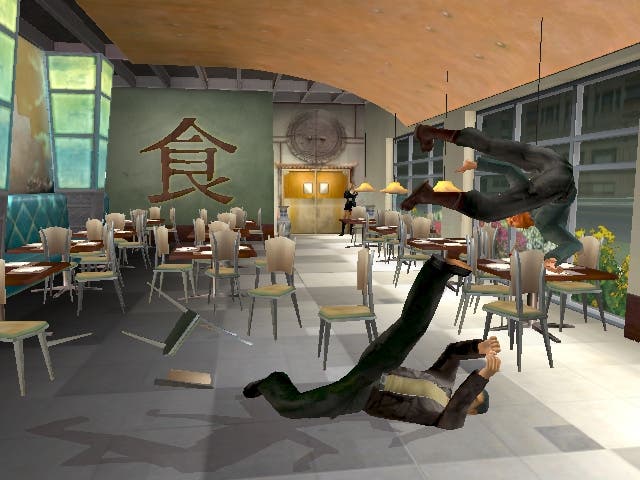
Fortunately, LA is overflowing with human scum, and as hardened cop Nick Kang, you're out for a piece of all of them. And have to be. As you race around the accurately constructed urban landscape, updates regularly crackle over your police radio, barking information about ongoing crimes in your area and inviting you to put a stop to them. It might sound like a trivial distraction, and many of these folks are just identikit pedestrians tussling with one another or revelling in the freedom of an unlicensed assault rifle or stolen car, but quickly you'll find that the key to making steady progress in True Crime is to slap down the criminal element every chance you get, and then invest the rewards - police badges accumulated in the bottom corner of the HUD - in heightening your policing skills at a number of 24/7 training centres.
There are tons of these buildings dotted around the city and they generally spring up on your GTA-style mini-map whenever you're in the vicinity, inviting you to engage in shooting range, technical driving and hand-to-hand combat challenges to earn new abilities and tools - like running attacks, neutralising precision pistol shots, laser sights for your guns, burnout starts for your car and more. All you have to do, badges permitting, is saunter up to the front door and head inside.
Although these little red criminal dots quickly become a nuisance, diluting the impact of events in the main story and effectively padding out the game to give it some longevity (and replay value) - and it was hardly charitable of Luxoflux to always have them pop up a few streets behind your speeding car - the "upgrades" you'll eventually convert this raw policework into have a serious impact on the story missions, improving your fighting, shooting and driving skills exponentially, and often making the difference between a Mission Completed and a Mission Failed. However there is another equally important aspect to True Crime's common policework, and that's the yin/yang good cop/bad cop rating.
Handcuffs at dawn
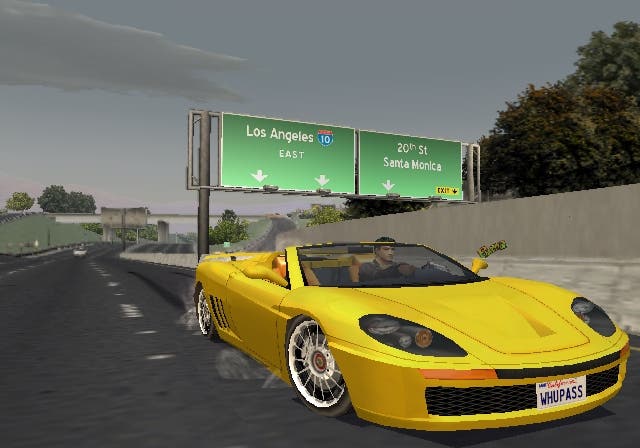
Being a good cop in True Crime may sound like a chore, and I certainly spent the best part of my early forays into the streets of Los Angeles needlessly gunning down perps [what, are you Judge Dredd now? -Ed] with my unlimited ammo pistols, but this sort of activity not only affects your karma, not only pisses off the citizens - so much so that they may eventually rise up and start striking back - and not only inspires your bosses at the Elite Operations Division to send a SWAT team after you, but also ruins your chance of seeing the best end sequence - because True Crime wants to reward good cops, not bad ones. While GTA might bring on tanks and other desirable vehicles when you show little or no respect for the law, and then almost challenge you to steal and race them to the nearest safe spot, True Crime offers no such subtle reward for your carnage - just problems, problems, problems. And, ultimately, the Mission Failed screen.
So then, your average sojourn from the madness of the storyline will send you off to defuse domestic arguments, dismantle bank robberies and run street racers off the road - all with a view to cuffing and booking them. As you round a corner and come across a street fight, for example, you'll see the two perpetrators clearly shown with red arrows above their heads, and, if they yield to the presence of such authority, you can simply walk up and hold R2 and circle to flip them round and cuff them, at which point you'll be told you've 'solved' the crime and you'll bank a good cop point for each cuffed crim who's still breathing, at which point they'll fade away into the ether.
On the other hand, more often than not you'll have to take a more active role in subduing them, firing a warning shot into the air (R1 plus R2), chasing them down on foot and slide tackling them with one of your action buttons, before engaging in a bit of fisticuffs (of which more later) to whittle down their health bar and get them on the ground where they're ripe for easy cuffing. You still get good cop points for this, and - with the neutralising shot upgrade earned - you still get good cop points for switching to precision targeting (hold R1) and lodging a slow-mo bullet in their arms or legs. You may even have to chase them on wheels (and they like to steal cars, especially yours, if the opportunity arises), but as long as you bring them to heel by staying within range and mashing the R1 button to shoot their car to bits, and don't then run them over or auto-target and shoot them in the face when they give up, you'll still bank some good cop points.
Where is the fun?
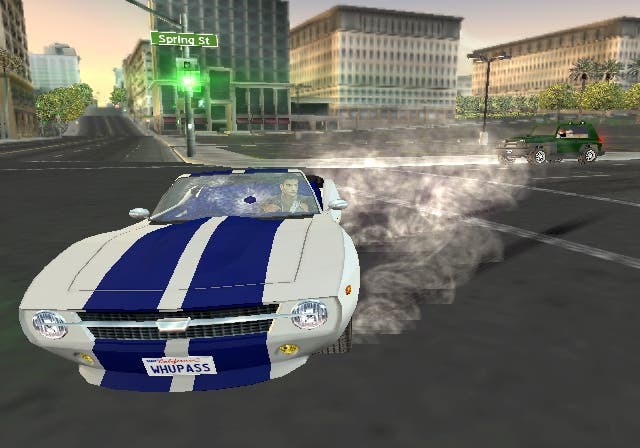
Strict adherence to the letter of the law (or at least letters which just about scrape their way into the bounds of the law - "You have the right to remain unconscious!") means that you'll stand a better chance of clobbering your way through the hell-raising main story missions, eking cut-scene after cut-scene of narrative out of the game and finding your way into some entertaining set-pieces, like a stealth-based incursion into a Russian spa, or a Getaway-style assault rifle-aided shootout in a butcher's. These missions are often more simplistic and less learn-'em-up than their competition in GTA or The Getaway - in fact they're generally just glorified versions of their street crime alternatives - but there's something compelling about your continually clichéd back-on-the-force rampage through the gang elements of Los Angeles. What is it?
Well it's certainly not the driving. Twitchy handling, huge turning circles, an unsatisfying handbrake and virtually indestructible cars which I can't for the life of me remember ever flipping or doing much beyond managing to stay airborne for half a second, all conspire to render the driving element rather off-putting. First impressions in a shop or demo may even be enough to put buyers off completely, and although things improve markedly once you claim the ability to accelerate like a rocket, and realise which bits of scenery are destructible (trees, lampposts, wire fences) and which aren't (walls, bushes), taken on its own the driving aspect of True Crime is actually fairly weak - although being able to lean over the back seat and fire out of the shattered windscreen, automatically targeting your adversary wherever they happen to be, is something neither GTA or The Getaway did as effectively. No, it's not the driving that keeps you playing. Maybe it's the beat-'em-up aspect?
No, it's certainly not the beat-'em-up aspect, easily the most frustrating part of True Crime. Faced with multiple adversaries, a lock-on/lock-off toggle might have been nice, but there is none - all the targeting in True Crime is automatic. You get used to this quite quickly, but the actual combat is also draining and, for my well-worn thumb at least, a physically painful mashing. Each enemy can take a certain number of hits before he becomes 'dizzy', opening him up to a button combo finishing move, which may or may not be enough to incapacitate him completely. These moves vary in effectiveness from the ones written in the manual (two-stroke attacks like "Monkey Paw!") to the more impressive grapple-throws learned at the expense of hard graft in 24/7 training centres, but they're not the problem - the problem is breaking down opponents.
Fists and firepower
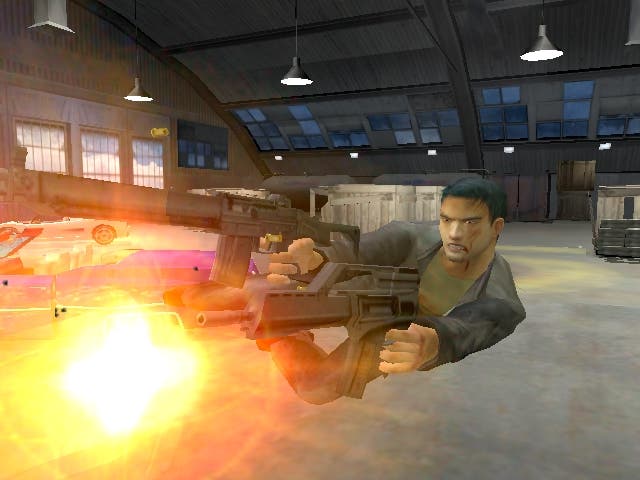
Although you're advised to aim high or low with your attacks depending on your opponent's blocking stance, sometimes it just isn't enough. One encounter about halfway through the game - at the end of a branching strand of storyline in which you've hooked up with an actress-turned-crook - has you fighting a nasty lass with a front-flip kick attack which is almost entirely unblockable. If you're standing and you stab a button as she attacks (there's no time to get out of the way) then you'll probably survive, but if you make it to the concrete and she persists with the same move, you are powerless to do anything but take hit after hit after hit until you die - staggeringly frustrating. A later fight against a group of winos doesn't throw up any unblockable moves, but the third bum blocks just about every attack you can throw at him, and it took literally hours of plugging away to break him down. It doesn't help that his predecessors were scraping Nick's face with broken bottles and flick-knives, either, especially in a game where mid-level health packs are rarer than a well-behaved third-person camera system.
Hand-to-hand combat, then, quickly becomes one of the most dreaded of the game's various activities, unless it's against the poorly equipped guys and gals of LA's street-side criminal fraternity, most of whom crumple easily and satisfyingly after a few blocks, pokes and Monkey Paws. Surely then the thing that keeps you playing has to be the gun-slinging, Max Payne-style shootouts? It can't be the stealth, as that's poorly implemented (with questionable collision detection for a start) and invariably simple, so that really does leave the shoot-'em-up aspect. It's got to be that.
But, again, taken on its own True Crime's gunplay couldn't hold up a whole game. The button mashing auto-targeting gunnery is played out with unlimited ammo pistols and the occasional assault rifle or shotgun (picked up - or rather kicked up to your hand - with circle), and as long as you don't find yourself reloading in a sea of Kalashnikov rounds or succumbing to a sniper's bullet, you should do fine. There's nothing new here (gunplay is halfway Dead to Rights with its targeting, halfway Max Payne with its rolls and slow-mo dives), and the precision targeting aspect is frustrating because the analogue aiming is too brittle and always has you over-compensating. All too often (particularly on the firing ranges) you'll be trying to shoot precisely against the clock and find yourself whipping the sights back and forth across the vital area because there's no middle ground between 'edging' and 'lurching'.
Guilty
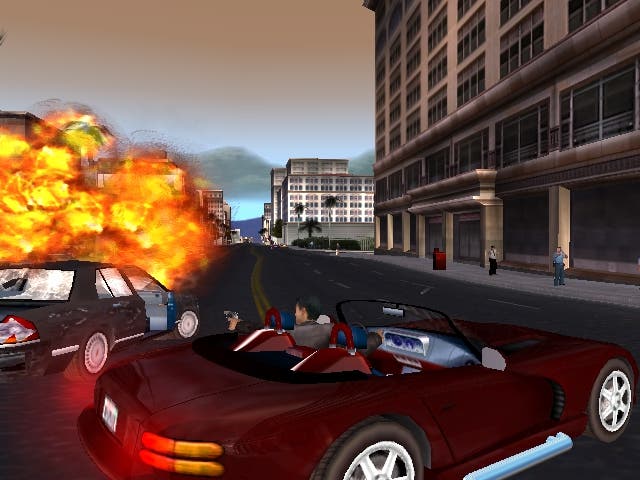
For me, the true crime here is that Luxoflux gets away with its game not because individual elements are worthy of merit, but because many of us want to play a Streets of LA sort of game, peppering accurately modelled locations with bullets, cop clichés and tyre marks, and we're willing to put up with countless flaws and inconsistencies to get what we want, not to mention all the usual third-person/free-roaming traps - countless load screens for individual missions, an erratic camera that gets caught on bodies and clips in and out of walls, and even targets enemies such that you can't navigate more than a few feet away from your current encounter - particularly unhelpful when you've just flawed a vandal in a dojo and fancy picking up the samurai sword you know is lying on the floor somewhere just off-screen.
The fact is that there's just something compelling about the game - and it's not any particular element over another - it's just something about the cohesiveness of the whole thing and, I would imagine, the transparency of your progress. It's nice to know that you're on Episode VI - with only a couple more episode slots left on the mission select screen - and to know which missions you've finished, to be able to access alternate missions and intro cut-scenes at the push of a button, and to be able to embark on branched storylines, unlocked relatively easily as you make progress through the main narrative stand.
And, dammit, it's nice just to give up once in a while. There were definitely some times in GTA III, Vice City and especially The Getaway when, blood boiling, faced with hurling the pad across the room for the umpteenth time, we would have taken a blot on our copybook and scratches and scars all over Tommy Vercetti or Mark Hammond's smug gangster faces just to make some progress. Curiously and thankfully, True Crime lets you do this - allowing you to navigate your way to the end of an episode and sometimes even onto the next one if you manage to finish off a certain percentage of that episode's missions. There's a 100 per cent requirement to make progress by the latter stages, and rightly so - you'll earn a particular free upgrade and a "Bonus Cruisin'" stage if you obtain 100 per cent for any given episode - but a few unblockable bums and stilettos-to-the-face notwithstanding, the only thing liable to derail your steady progress with the "Continue Story" option in play is your lack of interest in Nick Kang's general policework around LA.
Corporal punishment
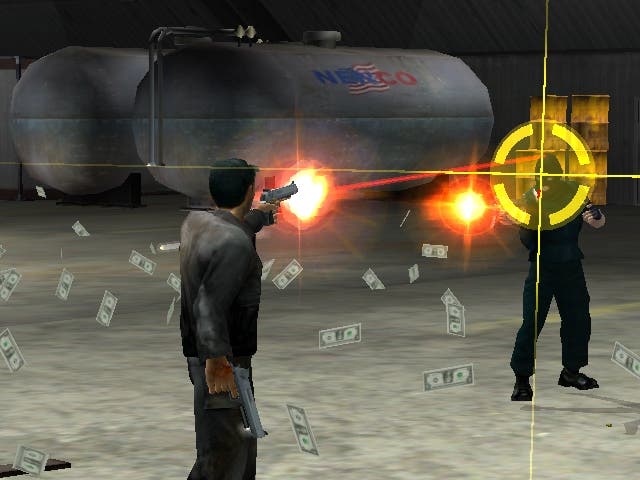
While it's true that you can make progress without stopping to accumulate upgrades and do the City of Angels' dirty work, you'll get stuck a lot quicker, and things like 'back attacks' (stabbing a button to kick or punch someone behind you), faster aiming and reloading and burnout starts are critically important by the end of the game - something I learned to my cost. Eager to get to the end of it and then play around with the game sandbox style as everyone does with GTA, I spent many an hour cursing the game and getting thoroughly angry with it - particularly the beat-'em-up aspects - simply because I hadn't been playing it the way the developers intended.
If you plan to get the most out of True Crime, and want to have fun rather than feel like forcing nails into your eyes and running over your own head with a traction engine [something Tom enthused about countless times yesterday -Tom's instant messenger pals], then you'll need to play it thoroughly all the way. Do this, and the game is much more satisfying and enjoyable as a result. If you've been playing True Crime over the weekend and sitting around wondering how I can muster any enthusiasm for the game having finished it, then perhaps it's time for you to head back to an earlier, leisurely driving mission and just police the streets and train yourself for a bit. The benefits are vast and your sanity is at stake if you don't...
Playing the game properly also deflects attention away from the game's hero, Nick Kang, who is one of the most unlikeable folks I've ever had the displeasure of thumbing around a third-person action game. He's built up as this renegade with a heart of gold, a guy who looks out for his partner (rushing to help her instead of chasing a fleeing Triad) and his brother (rushing to help him instead of cuffing a Russian crime lord), and he's supposed to have this massive back-story of pain and abuse after his father - Henry Wilson - was accused of corruption and disappeared in mysterious circumstances, but it's difficult to care one iota about a prat like Kang who runs around shooting his mouth off and yelling stupid things as you try desperately to concentrate on the action. At times, he sounds like he's auditioning for a vampire's roll in Buffy.
The final act
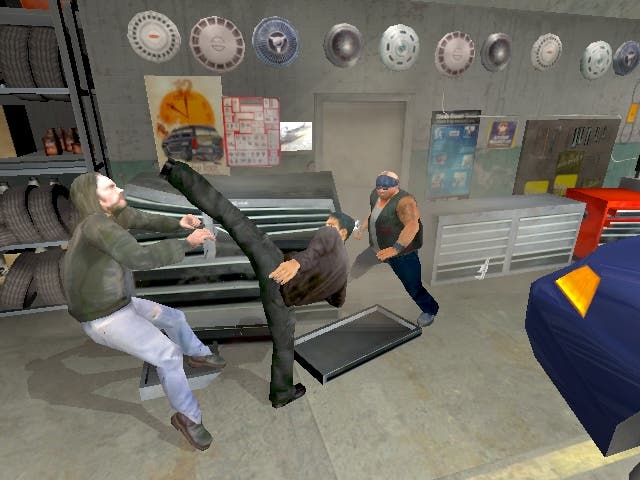
Add to that that cut-scenes are generally wooden, voice acting - with the exception of Christopher Walken's enjoyable grey-haired, father figure cop - is rather melodramatic, and the dialogue sounds like the first words that spilt onto the page, and you're left with a narrative that basically serves to prop up the action, rather than driving your interest in it. In a sense, it's a miracle anyone's playing it at all, but, as we said, there's just something - and perhaps that something is True Crime's Die Hard-style approach to the whole thing. Let's face it, GTA was fun, but it was more about exploration, insane stunts, crazy sub-missions and comical characters than it was about the visual side of a high-speed chase or shoot out. What True Crime has that GTA doesn't is relatively detailed character models, easy shoot-'em-up mechanics, both in-car and on-foot and huge tracts of destructible scenery - things like that. On the latter point, smashing an enemy head first into a toilet cubicle and watching the whole thing smash into broken china, bubbling U-bends, splintered wood and crumpled masonry is really quite something.
It's a game about smashing up the Streets of LA in the pursuit of the greater good. It''s about being the Harry Callahan sort of cop who would rather give speeches and then use a massive slug to incapacitate you than just point a gun, read your rights and sling you in the paddy wagon. The reason True Crime succeeds isn't its cinematic presentation, its countless tie-ins (Snoop Dogg as a playable character, anyone?), its hip-hop stylings (the soundtrack is like the wrong shade of varnish) or a main character who lurches from loudmouth to idiot to tragic figure in the space of a load screen - the reason it succeeds is because it lets us do marginally different things to the other GTA-alike titles, and enough of them are entertaining enough to make the next mission seem worth fighting for.
Streets ahead?
True Crime is this year's The Getaway - it's not GTA and it will frustrate for some on that basis, but it's a respectable enough game in its own right as long as you don't "play it the wrong way", which will lead you down a path of frustration and pad-smashing fury. If you can put up with a few flaws and need your fix of free-roaming criminal antics, then True Crime just about delivers, even if it is a bit short on insane stunts.

